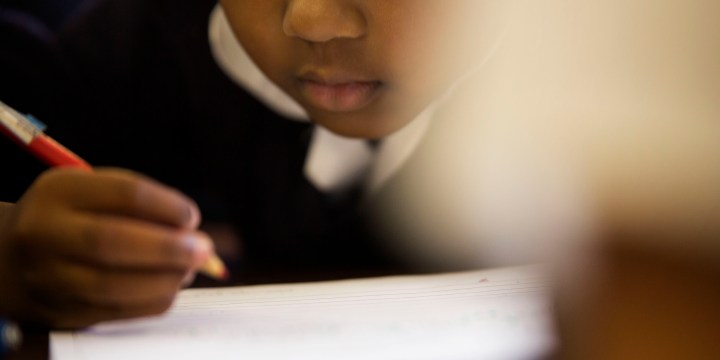RED ALERT
Urgent appeal to government to get cracking on a national action plan to halt illiteracy in SA

The Department of Basic Education has not done enough to ensure all children can read for meaning at the age of 10 by 2030. Urgent interventions are needed, a panel of education experts has found. The predictions are alarming - 69% of 10-year-old pupils in South Africa will be unable to read for meaning in two years time.
There have been several interventions to improve early reading for meaning in Gauteng, the Western Cape, the Eastern Cape and the Northern Cape, but the Department of Basic Education has not yet come up with a budget or plan to address South Africa’s literacy crisis.
This is one of the key findings in the 2024 report of the 2030 Reading Panel of education experts, chaired by former deputy president Dr Phumzile Mlambo-Ngcuka and released on Tuesday, 13 February.
“Since 2021, we have seen impressive moves by provincial education MECs and their leadership teams to implement evidence-based, province-wide reading interventions, and we implore current and future leaders to continue and build upon this important work,” the report reads.
Current predictions are that about 69% of 10-year-old pupils in South Africa will be unable to read for meaning in 2026.
The panel warned that budget cuts and austerity measures would hamper further progress.
It noted that annual spending per pupil would decrease from R24,000 in 2020 to R21,635 by 2025, based on the medium-term expenditure framework.
It added that anticipated austerity budgets, compounded by the financial pressures of the 2023 wage bill, which led to a R30-billion shortfall, mean there is a real risk that budget cuts or the freezing of spending will happen where the need is greatest: in learning materials, books and new teacher posts.
“We cannot afford to continue ignoring the lessons from interventions that work as the financial cost and the cost to learners only compound,” the report stated.
It predicted a looming teacher and school management crisis if the Department of Basic Education does not implement a succession plan for 58% of Limpopo teachers who will retire in the next 10 to 15 years, with similarly high percentages in the Eastern Cape (51%) and Mpumalanga (50%).
The panel, which is a civil society organisation comprising 18 academics and activists, aims to ensure that by 2030, all South Africa’s children can read for meaning by the age of 10.
Read more in Daily Maverick: Don’t blame Covid-19 for the reading catastrophe revealed by Pirls — blame our education system
The 29-page report follows the release of the 2021 Progress in International Reading Literacy Study (Pirls), which revealed that 81% of Grade 4s in South Africa cannot read for meaning.
The study also revealed that South Africa experienced the largest decline in reading outcomes among the 33 regions that participated in both the 2016 and 2021 studies, with 50% to 60% of South African pupils in 2021 found to have been behind 2016’s Grade 4s.
Learning gaps increasing
Analysing the findings of the Pirls study, the 2030 Reading Panel said: “Achievement gaps increased across socioeconomic and language lines.”
The report stated that the difference between pupils testing in English and the lowest-achieving African language, Setswana, was 171 points, translating to 1.8 years of learning.
“Whilst there is no reason why the system should not return to pre-Covid trajectories and show improvements in Pirls 2026; based on the current projections, it will still take South Africa 80 years for all children to read for meaning,” the report from the 2030 Reading Panel reads.
Extrapolating from the pandemic days, it found that when there is pressure on the system, the poorest pupils are those mostly heavily impacted.
“Similarly, as we move into times of increased fiscal austerity, if we do not have guaranteed minimums in place to support reading, the learners most impacted will be those in no-fee schools.”
‘No plan’
The report said there was neither a comprehensive catch-up plan for 2021’s Grade 4s nor a national-level strategic initiative to drastically increase the number of pupils who can read for meaning.
“The dearth of targeted action continues to perpetuate the country’s ongoing literacy crisis, leaving a critical need for effective measures to address and reverse this trend,” the report reads.
Read more in Daily Maverick: Still no national plan to address SA’s reading crisis as percentage of children who can read for meaning declines
The Department of Basic Education (DBE) was developing a new reading strategy that includes the provision of pupil-teacher support materials, storybooks and working with universities to improve initial teacher preparation.
“However, the delays in publishing the [strategy] document does begin to raise concerns around the process under way and the extent to which it will be effectively implemented,” the report reads.
There was a new window of opportunity in this election year for political parties and the next administration to make decisive steps to ensure universal literacy, the report found.
Recommendations
The panel’s recommendations to address the reading crisis include:
- Implementing a universal standardised assessment of reading at primary school level;
- Allocating meaningful budgets for reading resources and reading interventions;
- Providing a standard minimum set of reading resources to all Foundation Phase classrooms (grades R to 3) as a matter of urgency; and
- Conducting an audit at universities of pre-service teacher education programmes.
Basic Education Department spokesperson Elijah Mhlanga had not responded to questions at the time of writing.
Experts opine
The dean of Stellenbosch University’s faculty of education, Professor Mbulungeni Madiba, said the report highlighted a very serious literacy crisis in South Africa.
“Our 10-year-old learners or Grade 4s are not able to read for meaning in English and in their home languages. This is a serious problem as reading is a fundamental skill that empowers learners to access knowledge, think critically, and engage with the world.”
Read more in Daily Maverick: From bad to worse: New study shows 81% of Grade 4 pupils in SA can’t read in any language
The report, he said, made several recommendations which were very important, as reading for meaning is at the heart of education and intellectual growth.
“The ability to read for meaning is more than just deciding words, but is essential for developing 21st-century skills such as critical thinking, problem-solving, communication, collaboration and so on. If our children fail to develop these skills, our country will be left behind [by] other developing countries.”
Madiba said parents and communities had an important role in creating a conducive environment for literacy development.
“As they [say] in African culture, ‘It takes a village to raise a child’.”
University of Fort Hare senior researcher Dr Siyabulela Fobosi said the report shed light on the dire state of literacy in South Africa and emphasised the urgent need for targeted action.
“With 81% of Grade 4 learners unable to read for meaning and the percentage of non-readers doubling since 2016, the situation demands immediate attention,” Fobosi said.
The widening gap between pupils in different socioeconomic brackets and the staggering decline in reading outcomes highlighted systemic inequalities.
“With only six years remaining until 2030, urgent action is needed to meet the National Development Plan 2030 targets successfully,” he said.
“Amid political transitions, the recommendations rally for government action and public support in prioritising literacy as a cornerstone of South Africa’s future prosperity.”
The head of the University of the Witwatersrand’s educational leadership, policy and skills division, Professor Brahm Fleisch, said one of the most important of the UN’s Sustainable Development Goals was the focus on ensuring that all children have access to quality education by 2030.
“To achieve this, all children need to be able to read with understanding by the end of the early grades,” Fleisch said.
“The good news is that significant progress has been made in some provincial departments of education, and there is a real alignment of NGOs and both local and international funders to achieve this vital societal goal.” DM




















 Become an Insider
Become an Insider
Disgraceful, 70% of children in reality functionally illiterate…. and then the er, pass Matric, and go to University or College and battle!
Goodday Sir /Madam
I would like to know whether you can inform us about who are responsible for paying those who are tutoring the learners
I am from in the Little Karoo in Oudtshoorn,6625
We are experiencing the the that the learners parents are not able to pay for the tutor but they attend Model C schools. Parents are not even interested in their children education especially when it comes to the most important part reading and writing. Educators time are very limited and don’t have time for these tasks.
It is here where extra classes are given but the PARENTS REFUSE TO PLAY THEIR PART
I am teacher at a high school on th Cape Flats , the education system is failing poor learners. Learners cannot read or write. The schools are basically criminal hotspots to sell drugs and other illegal activities.